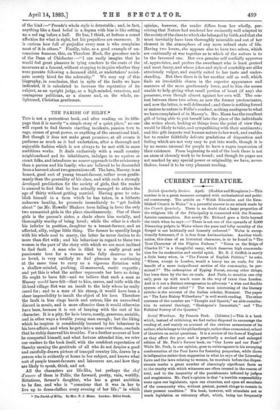CURRENT LITERATURE.
British Quarterly Review. April. (Hodder and Stoughton.) —This number is in a great measure occupied with ecclesiastical and politi- cal controversy. The article on " Welsh Education and the Esta- blished Church in Wales" is a powerful answer to an attack made by the Church Quarterly. There is no doubt that a large proportion of the religious life of the Principality is connected with the Noncon- formist communities. But surely Mr. Richard goes a little beyond the truth when he says :—" There is not one of the upwards of 3,000 Dissenting pulpits in Wales where the pure and lofty morality of the Gospel is not habitually and honestly enforced." Wales is excep- tionally fortunate, if it is free from Antinomianism. Another vindi- cation, this time of an historical character, is to be found in " The True Character of the Pilgrim Fathers." "Notes on the Reign of Charles II." is a thoughtful essay, which deserves high commenda- tion for its moderation and candid spirit. Mr. R. J. Griffith is surely a little hasty when, in "The Future of English Politics," he asks, " Where, except in London, would a heavy tax on coals, for the benefit of a mere insignificant section of the community, be per- mitted ?" The redemption of Epping Forest, among other things, has been done by the tax on coals. And Paris, to mention one city only, puts up with much more in the way of taxes than London. And is it not a distinct retrogression to advocate "a wise and flexible system of out-door relief " ? The most interesting of the literary articles is the account of the Italian scholar, Muratori. The paper on " The Late Bishop Wilberforce " is well worth reading. The other contents of the number are "Thought and Speech," an able contribu- tion to natural theology, " Shakspere's Immortals," and "The Political Survey of the Quarter."


































 Previous page
Previous page